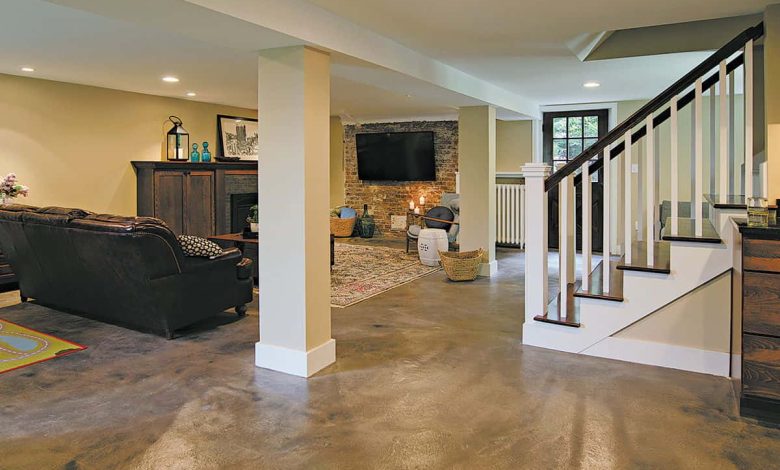5 Best Basement Flooring Options 2022

If you’re looking to spruce up your basement, you can choose from a variety of options, from concrete to tile. Concrete is a durable choice that resists moisture. In addition, it comes in a variety of colors and styles. For the cheapest option, you can opt for painted concrete. Stained concrete offers the same features, except that it uses a stain instead of paint. Concrete can also be used as an insulator and moisture barrier.
Different Types Of Basement Flooring
In this post, we will discuss some different types of basement flooring. So, choose the best one that is perfect for your basement decor.
-
Vinyl flooring
When choosing basement flooring options, consider the budget. A sheet of vinyl is relatively inexpensive and easy to install. This type of flooring is easy to replace and can withstand high moisture levels. Vinyl also provides a softer surface for your feet. Luxury vinyl plank is another affordable option that’s easy to install. This type of flooring mimics wood or stone tile, and many styles come in a variety of price ranges. It is also waterproof, making it ideal for a basement. Most vinyl sheet flooring products also include an underlayment that prevents moisture from seeping through the floor.
Sheet vinyl, or luxury vinyl planks, is an excellent choice for many people. This type of flooring is waterproof and is available in a variety of styles, including wood-like looks. Unlike painted concrete, luxury vinyl plank flooring is dimensionally stable. It is fully waterproof and durable. While solid hardwood may be one of the worst basement flooring options, luxury vinyl planks provide a stylish option for any basement.
-
Engineered hardwood
The advantages of real hardwood floors over-engineered ones are many. First, they’re both durable, long-lasting and resistant to varying climates. Second, real hardwood floors are expensive and require professional installation. Fortunately, engineered hardwood flooring is affordable and can handle the moisture in a basement much better than solid hardwood. This flooring option offers the same wide variety of species and colors, and it doesn’t warp as easily.
Another benefit to engineered hardwood is that it’s easy to install. DIYers can install this type of flooring using a click-lock system. Depending on the quality of the engineered hardwood, these floors can last for decades. The lifespan of engineered hardwood flooring depends on the thickness of the plank, but thicker planks can last up to 80 years. Even though hardwood floors are beautiful, they can be susceptible to water damage. To remedy this issue, it’s best to install an engineered wood flooring solution in the basement.
-
Ceramic Tiles
When it comes to waterproof basement flooring options, ceramic tiles are one of the best options. These tiles can withstand varying humidity levels and temperatures, and they will stay intact even when wet. Ceramic tiles also come in a wide variety of colors and designs, and they can even mimic wood flooring! Another benefit of ceramic tiles is that they are easy to clean. Dirt and liquid spills can simply be wiped off, and you can use heavy-duty cleaners without damaging them.
Another good choice for a low-cost basement flooring option is slate ceramic tiles. Slate ceramic floors give your basement a sleek, modern look that stands up to high-traffic areas. And because of their high resistance to abrasion, they’re great for basements. Tiles are also easy to install, and even a novice homeowner can do it! While you can try to install them yourself, if the subfloor is brittle or uneven, make sure you repair it first. Also, make sure you secure the plywood subfloor with a piece of wood before installing tiles.
-
Textured concrete
There are many advantages to using textured concrete as a basement flooring option. This material is highly durable and flexible, so it can accommodate uneven subfloors. Moreover, it is easy to replace damaged tiles. You can replace a single tile with another in case of spills or wear. Another plus is that textured concrete does not require sealing, so you can simply broom it clean. Moreover, you can opt for an area rug that partially covers the floor, so that the space is softer to the touch.
The downside of textured concrete is that it requires more work than other types of basement flooring. However, it can look like anything you want, depending on how skilled your installer is. While this type of flooring can look more expensive, it is an excellent option compared to other options. It is also surprisingly affordable. It only requires sprucing up the subflooring. It can last for many years and will look great in your basement.
-
Area rugs
Carpet is not the only flooring option for the basement. Area rugs can be an attractive addition to your space. These rugs provide warmth and softness to your floors. They also make the room easier to clean. However, they should be replaced frequently as they may trap moisture. Tile is another option for your basement. Both flooring types have different advantages and disadvantages. Here are a few important points to consider before deciding on either material.
Tile and porcelain are ideal for the basement but they can be expensive and hard to change. Tiles may be cold and uncomfortable, so consider putting an area rug in the room. You can also install an electric heating system under your tile floor. This way, you won’t have to worry about the temperature. Nevertheless, if you still can’t decide which flooring option is best for your basement, consider installing area rugs.
Conclusion
We make sure that this article will help you to choose the best flooring for your basements. So, select the one that is perfect for your interior decor. These floorings are relatively inexpensive, but be aware of the time and effort involved in the installation. You’ll also have to pay a professional Abu Dhabi maintenance company to install these flooring. You can hire someone to install them for you, but you should be aware that sanding can add to the overall cost of the product.




